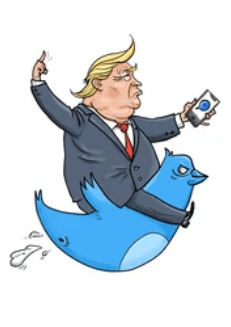Changing the World, One Tweet At a Time: The Emergence of Slacktivism in Social Media

In the last few years, social media has developed as a source where people not only have access to the news, but also as a platform of self-expression. Even political discourse now takes place on twitter: there is a special Wikipedia page dedicated to President Donald Trumps’ behavior on social media. Fair enough, former President Obama also has a page dedicated to his social media activities. However, Trump even has a special section dedicated to the insults he made on Twitter. With the rise of social media, a quickly accessible platform became available for everyone who has access to the internet: an easy way of self-expression was born.
Sharing is caring
The role of politics in social media becomes clear when considering that everyone can share everything, and therefore, also their political views. However, social media also has the capacity to create a large sense of belonging. It is easy to find people on social media who share the same views as you do: it can make you feel like you belong to a group. Sharing, liking, and retweeting posts that resonate with your own opinion can give you a sense of contributing to a cause. However, this also poses a threat.
Slacktivism
Standing for something is not directly a bad thing to do, of course. Nevertheless, are you really contributing to a cause if you share one post on Facebook? The influence of social media on daily life has grown over the last few years. As frequently mentioned by Trump, there is the danger of fake news. So, if the cause you are supporting through social media turns out to be fake, what does that mean for general political support on social media? It is, after all, a very easy way to demonstrate your support for something, as you do not really have to do something besides clicking a button. This form of activism is therefore called slacktivism. According to the online Oxford Dictionary, the term slacktivism is defined as “The practice of supporting a political or social cause by means such as social media or online petitions, characterized as involving very little effort or commitment.” So naturally, there is a contribution to the cause. However, this is seen as the easy way to contribute. It will not take as much effort as actually taking to the streets to protest or going door-to-door to spread your point of view.
Furthermore, the term slacktivism ties into something else, which is the gratification people get from doing something good. A sense of contributing to a greater cause might give a sense of content to the person trying to contribute. This therefore poses an interesting juxtaposition. The effort a person makes might be small, however, the satisfaction a person gets from doing this might be big. But is this a bad thing? Even though there is little effort, if it makes someone happy or gives them a sense of having contributed to a cause, does it really matter?
#Hashtags
Sometimes something on the internet goes viral, and it becomes an incredibly hot item, seemingly out of nowhere. This might even cause outrage on the internet. Of course, not all outrage is immediately bad: the #MeToo movement was greatly successful because of its visibility on social media. Thus, this clearly shows the positive side of online activism. However, it was also easy for people to disagree with this, as they could simply comment or share, like, or post an opposing view. Hashtags are impactful yet most of the time shortly lived. But they do greatly contribute to the accessibility for the public to share their opinions. The French flag filter on Facebook, for instance, was an easy way for people to demonstrate the support for a cause. It was relatively low effort, but it was a very clear statement.
Oh Donald
Social media provides a platform that is easily accessible for all people. Over the course of the years, the influence of social media has grown exponentially. It influences the political sphere, as Donald Trump’s tweets have become a genuine way for the American president to communicate with other people. Social media provides a platform for people to express their opinions and beliefs. Activism has become intertwined with the rise of social media, which makes it easy for people to engage in political discussions. It has become a stage for political discourse. And even though it is easily accessible, apparently it is not for all:

